At Home in the Dark Read online
Page 5
His house was at the other end of town. Somehow he got one foot in front of the other and made it to the main street again. He thought about firing shots into the air to alert the town that something was wrong, but if he did that, he would warn Ab Newton, too. The man might go ahead and kill Clarissa instead of bringing her to the church as Holman had planned, just so he could make his escape from Wagontongue sooner. Instead, Blake summoned up his fading strength and yelled, “Fire! Fire!” as he stumbled toward his house.
A few cowboys were just going into the Lucky Cuss. They heard Blake’s cries and shouted for the other men in the saloon to come help them as they hurried toward the church. The orange glow of the flames was visible now over the roofs of the town. Frontier settlements lived in fear of fire. A crowd would gather in a hurry to stop the blaze from spreading, Blake knew. More than likely, the church would be lost, but it could be rebuilt.
Clarissa. That thought drove him on.
He could have tried to get some of the men to help him, but it never occurred to him. His fear for his wife had crowded out everything else from his mind. The unsteady run up the street seemed to take an eternity, but finally the neat frame house was in front of him and as he started up the walk to the porch, he heard a scream inside.
Like a river turning back on its own course, the pain flowed away from him. He felt nothing except a terrible urgency as he went up the steps onto the porch and hit the door with his shoulder and half-ran, half-fell into the room. The Colt was in his hand as he saw a lean, wolfish man shoving Clarissa away as he turned toward the unexpected threat. Her face was wild with fear and her dress was torn from the struggle. Nearly all of Blake’s attention was focused on the man clawing at the gun on his hip, but for a split-second he saw the plates and bowls of food sitting on the table, beyond the killer, waiting for Blake to return from his night rounds and sit down to supper with his wife . . .
The gun in Blake’s hand roared and jumped once, twice, three times. Muzzle flame leaped from the barrel of Ab Newton’s gun, but Blake didn’t feel any fresh shocks. Maybe he was too numb to feel them. Maybe Newton had just drilled him and he didn’t know it. But he saw Newton fold up, crumpling in on himself, and hit the floor. The gun skittered out of Newton’s hand. He jerked a couple of times and then lay still.
Clarissa screamed and said, “Dave!”, then rushed toward him. Blake tried to reach out for her but grasped only a black nothingness instead.
• • •
He moved along the boardwalk, slower than in the past, using a cane now even though he didn’t really need it most of the time. But now and then the weakness came back and having something to lean on came in handy. He stopped at the door of each business and rattled the knob.
“If you want to move on again, it’s all right with me,” Clarissa had said as she stood beside the bed where he was resting. “I understand.”
“No, we’ll stay,” he told her. He reached out, took her hand, squeezed it. “I’m done running.”
Because there was no point in it, although he hadn’t told her that. No man could escape the past. It was always there, shambling along behind him like a hungry wolf, ready to reach out and rip him with memories. Whether he’d intended it or not, his actions had cost the life of one innocent woman and nearly the life of another. A man who’d never really done anything to deserve it had died consumed by hatred. Nothing in Blake’s power could change any of that.
But he could make sure everything was locked up nice and tight, and the town was safe and peaceful around him. He paused for a moment, leaned on the cane, took a deep breath, and moved on to check the next door.
The Flagellant
Joyce Carol Oates
Not guilty he’d pleaded. For it was so. Not guilty in his soul.
In fact at the pre-trial hearing he’d stood mute. His (young, inexperienced) lawyer had entered the plea for him in a voice sharp like knives rattling in a drawer—My client pleads not guilty, Your Honor.
Kiss my ass Your Honor—he’d have liked to say.
Later, the plea was changed to guilty. His lawyer explained the deal, he’d shrugged O.K.
Not that he was guilty in his own eyes for he knew what had transpired, as no one else did. But Jesus knew his heart and knew that as a man and a father he’d been shamed.
• • •
At the crossing-over time when daylight ends and dusk begins they approach their Daddy and dare to touch his arm.
He shudders, the child-fingers are hot coals against bare skin.
Hides his face from their terrible eyes. On their small shoulders angel’s wings have sprouted sickle-shaped and the feathers of these wings are coarse and of the hue of metal.
Holy Saturday is the day of penitence. Self-discipline is the strategy. He’d promised himself. On his knees he begins his discipline: rod, bare skin.
(Can’t see the welts on his back. Awkwardly twists his arm behind his back, tries to feel where the rod has struck. Fingering the shallow wounds. Feeling the blood. Fingers slick with blood.)
(Not so much pain. Numbness. He’s disappointed. It has been like this—almost a year. His tongue has become swollen and numb, his heart is shrunken like a wizened prune. What is left of his soul hangs in filthy strips like a torn towel.)
Lifer. He has become a lifer.
But lifer does not mean life. He has learned.
Shaping the word to himself. Lifer!
—twenty-five years to life. Which meant—(it has been explained to him more than once)—not that he was sentenced to life in prison but rather that, depending upon his record in the prison, he might be paroled after serving just twenty-five years.
Incomprehensible to him as twenty-five hundred years might be. For he could think only in terms of days, weeks. Enough effort to get through a single day, and through a single night.
But it was told to him, good behavior might result in early parole.
Though (it was also told to him) it is not likely that a lifer would be paroled after his first several appeals to the parole board.
Where would he go, anyway? Back home, they know him and he couldn’t bear their knowledge of him, their eyes of disgust and dismay. Anywhere else, no one would know him, he would be lost.
Even his family. His. And hers, scattered through Beechum County.
Who you went to high school with, follows you through your life. You need them, and they need you. Even if you are shamed in their eyes. It is you.
Problem was, remorse.
Judge’s eyes on him. Courtroom hushed. Waiting.
What the young lawyer tried to explain to him before sentencing—If you show remorse, Earle. If you seem to regret what you have done . . .
But he had not done anything!—had not made any decision.
She had been the one. Yet, she remained untouched.
• • •
Weeks in his (freezing, stinking) cell in men’s detention. Segregated unit.
Glancing up nervous as a cat hearing someone approach. Or believed he was hearing someone approach. Thought came to him like heat lightning in the sky—They are coming to let me out. It was a mistake, no one was hurt.
Or, thought came to him that he was in the other prison now. State prison. On Death Row. And when they came for him, it was to inject liquid fire into his veins.
You know that you are shit. Ashes to ashes, dust to dust. That’s you.
No one came. No one let him out, and no one came to execute him.
He didn’t lack remorse but he didn’t exude a remorseful air.
A man doesn’t cringe. A man doesn’t get down onto his knees. A man doesn’t crawl.
His statement for the judge he’d written carefully on a sheet of white paper provided him by his lawyer.
I am sorry for my roll in what became of my children Lucas & Ester. I am sorry that I was temted to anger against the woman who is ther
mother for it was this anger she has caused that drove me to that place. I am sorry for tha
t, the woman was ever BORN.
Pissed him that the smart-ass lawyer wanted to correct his spelling. Roll was meant to be role. Ester was meant to be Esther.
The rest of his statement, the lawyer would not accept and refused to pass on to the judge. As if he had the right.
Took back the paper and crumpled it in his hand. Fuck this!
Anything they could do to you, to break you down, humiliate you, they would. Orange jumpsuit like a clown. Leg-shackles like some animal. Sneering at you, so ignorant you don’t know how to spell your own daughter’s name.
Sure, he feels remorse. Wishing to hell he could feel remorse for a whole lot more he’d like to have done when he’d had his freedom. Before he was stopped.
• • •
Covered in welts. Bleeding.
A good feeling. Washed in the blood of the Lamb.
He believes in Jesus not in God. Doesn’t give a damn for God.
Pretty sure God doesn’t give a damn for him.
When he thinks of God it’s the old statue in front of the courthouse. Blind eyes in the frowning face, uplifted sword, mounted on a horse above the walkway. Had to laugh, the General had white bird crap all over him, hat, shoulders. Even the sword.
Why is bird crap white?—he’d asked the wise-ass lawyer who’d stared at him.
Just is. Some things just are.
But when he thinks of Jesus he thinks of a man like himself.
Accusations made against him. Enemies rising against him.
Welts, wounds. Slick swaths of blood.
Striking his back with the rod. Awkward but he can manage. Out of contraband metal, his rod.
It is (maybe) not a “rod” to look at. Your eye seeing what it is would not see “rod.”
Yet, pain is inflicted. Such pain, his face contorts in (silent) anguish, agony.
As in the woman’s sinewy-snaky body, in the grip of the woman’s powerful arms, legs, thighs he’d suffered death, how many times.
Like drowning. Unable to lift his head, lift his mouth out of the black muck to breathe. Sucking him into her. Like sand collapsing, sinking beneath his feet into a water hole and dark water rising to drown him.
The woman’s fault from the start when he’d first seen her. Not knowing who she was. Insolent eyes, curve of the body, like a Venus fly trap and him the helpless fly: trapped.
• • •
Plenty of time in his cell to think and to reconsider. Mistakes he’d made, following the woman who’d been with another man the night he saw her. And her looking at him, allowing him to look at her.
Sex she baited him with. The bait was sex. He hadn’t known (then). He has (since) learned.
He’d thought the sex-power was his. Resided in him. Not in the woman but in him as in the past with younger girls, high-school-age girls but with her, he’d been mistaken.
And paying for that mistake ever since.
To be looked at with such disgust. To be sneered-at. That was a punishment in itself but not the kind of punishment that cleansed.
In segregation at the state prison as he’d been at county detention because he’d been designated a special category of inmate because children were involved and this would be known. Because there was no way to keep the charges against him not-known. Because once you are arrested, your life is not your own.
Surrounded by “segregated” inmates like himself. Not all of them white but yes, mostly white.
Yet nothing like himself.
• • •
They’d come to search his cell. Again.
Because he could not prevent them. Because there were many of them and only one of him.
In his cell there was nowhere to hide anything. (So you would think.) Yet with sneering faces they searched the cell.
And inside his lower body with furious gloved fingers bringing him to his knees.
Yet could not discover contraband. For it was nowhere here.
Where’re you hiding it, Earle?—fucker we know you’re hiding something.
Their exultation in torturing him. Flushed faces, shining eyes, his screams are joyous to them.
Yet in this place they were confining him, the man who is free in his heart cannot be confined.
No prison, no segregated unit. No cell, no restraints, no straitjacket, no drugs forced down his throat or injected into his arteries to bind him.
Left him where he’d fallen moaning on the filthy floor. A metal instrument (might’ve been a spoon) they’d shoved up inside him into the most tender part of him had been so forcibly removed, ravaged tissue was carried with it slick with blood.
Thank you Jesus. Washed clean in the blood of the Lamb which is the most shame you can bear on this earth before you are annihilated.
On his knees alone in the night of Holy Saturday observing the seven stations of the cross the flagellant begins his discipline.
Each stroke of the rod against his bare back, bringing expiation.
Crawling on his belly. Tongue extended. Makes himself pencil-thin, slithering like a snake.
Yet: a snake that can control its size.
From the crevice to the concrete.
Scraped raw the skin of his hands, bleeding.
• • •
On Strouts Mill Road where the guardrail has been repaired.
Returning to his (ex)wife’s house, his house from which he’d been banished.
Fluidly he moves. He has the power to pass through walls. He has whipped himself into a froth of blood. He has whipped himself invisible.
(It has not happened yet—has it? He sees that it is waiting to happen.) And so this time it will happen differently. Jesus has escaped his enemies and will wander the world free as he wishes like any wild creature without the spell of a wrathful God upon him.
He will take Lucas and Esther with him, in their pajamas. Very quietly he will lift them in his arms. Daddy! Daddy!—the children are smaller than he recalls, this is startling to him, disorienting. The children smell of their bodies, their pajamas are soiled. Halfway he wonders if their mother has drugged them too, to make them sleep.
Seeing it is Daddy they are happy to see him. He will take them to safety. Except they are hungry—whimpering with hunger. The woman has put them to bed without feeding them. Daddy! To Burger King in the pickup. He will take them, he is their daddy. The woman has been left behind, unknowing. The woman is unconscious in her bed, sprawled in nakedness and smelling of liquor.
It will be his error, to think that the woman left behind will not exert her power over him.
Pressing down on the gas pedal. Highway a blur for Daddy too is ravenous with hunger. And thirst. Stops for a six-pack at the 7-Eleven. Pops a can open inside the store, cold beer running down his fingers. This will be observed on the surveillance tape. That Daddy has not eaten, and Daddy has not slept in forty-eight hours. Love for the kids is all Daddy has to nourish him.
Driving through stunted pines. Icy road. Slick pavement, black ice it is called. Your mother is to blame. The lying whore has sabotaged our family.
Until now the woman has been pulling the strings. They have been her puppets—the father, the children.
But no longer.
• • •
At the crossing-over time. At home in the dark.
As a boy he’d been taught. He had not wished to know, yet he had been made to know.
The stations of the cross are seven. Christ must bear his cross. Christ must stumble and stand upright again. Christ is bleeding from his wounds: chest, back, head. Soon, spikes will be driven through Christ’s hands and feet. It is supposed that Christ was made to lie down upon the roughhewn cross upon which he was nailed. Christ will submit to his crucifixion for it is written. Christ will die as a man, and descend to Hell. And on the third day Christ will rise again to enter the Kingdom of Heaven where he will dwell with the Father for eternity.
He can think of little else. Useless to try to sleep, he must do penance in the darkest hours of the night. Kneels
on the filthy floor of the cell. As he has been instructed.
Flagellant is a word no one speaks aloud. Yet many are the flagellants seeking penance.
The children’s faces! Lucas, Esther. You tend to forget, a child’s face is small.
The heads of children are small. Fragile as eggshells. Their arms, legs are thin. As if their bones are comprised of a material lighter than adult bones, easily snapped.
Lucas and Esther in their pajamas. Tenderly he lifts them from their beds. The shaking of his hands is steadied somewhat by the weight of the children, it is a good weight, like ballast.
Her fault, the woman’s fault, that his hands shake, for it is the woman’s fault that he can’t sleep, he must self-medicate, the pills leave him dazed and groggy and the other pills spur his heart to palpitations, cause him to break into oozing oily sweat. The woman has cast him from her life, she has made him an exile from his own household. Hadn’t he painted the interior of the little house, hadn’t he laid the linoleum tile, ash falling from a cigarette in his mouth. He’d stooped, strained his damned back. He’d done a damned good job. Kitchen floor, bathroom floor. He’d got the tiles at a discount and he’d laid them in and she’d said how beautiful they were, how she’d loved him for such care he’d taken to their home.
Tonight he lifts the children in his arms. Lucas first, then Esther. The little boy is three years old, the little girl is one year old. In that year, how much has happened! But he does not blame either of them, it is the mother he blames. Wrong for a mother to love her babies more than she loves their father.
Leaking milk, through her clothes. Disgusted and excited him, the breast-milk smell which is like no other smell.
In his arms against his muscled upper arms he holds the children. He’s proud of his body, or was. Working out, lifting weights, no screwing around at the gym, guys he’d known from high school were impressed. And these kids he’d loved more than his own life.
Christ, he has come to hate his own life.
He’d hated the mother more than he’d loved the kids. He did not deny it. Jesus understood. You could not look fully into the face of Jesus for the powerful light in his face but you knew that Jesus understood.

 The Fireman
The Fireman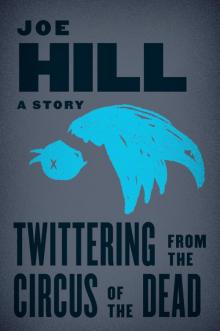 Twittering From the Circus of the Dead
Twittering From the Circus of the Dead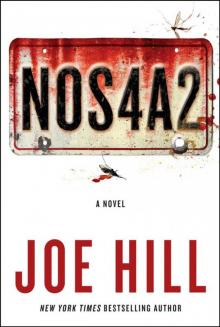 Nos4a2
Nos4a2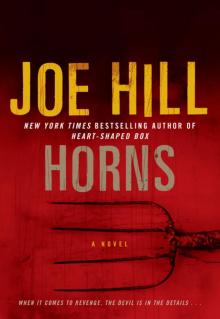 Horns
Horns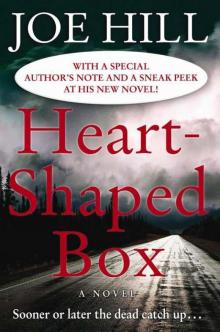 Heart-Shaped Box
Heart-Shaped Box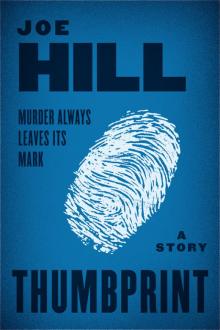 Thumbprint: A Story
Thumbprint: A Story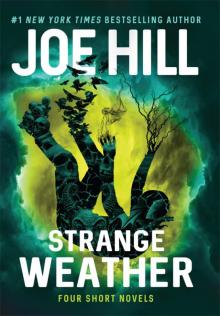 Strange Weather
Strange Weather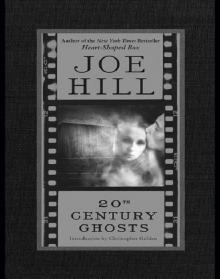 20th Century Ghosts
20th Century Ghosts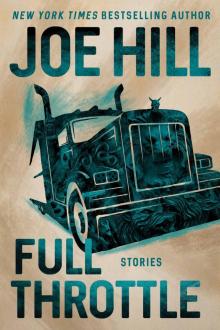 Full Throttle
Full Throttle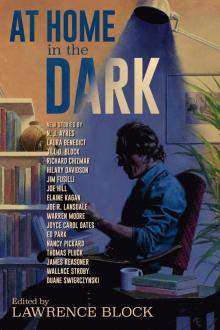 At Home in the Dark
At Home in the Dark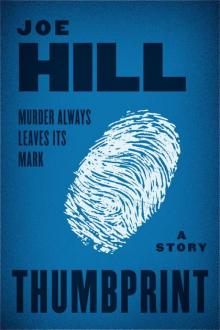 Thumbprint
Thumbprint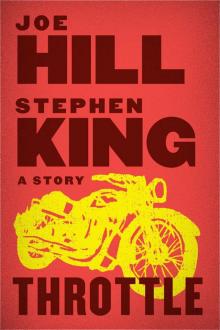 Throttle
Throttle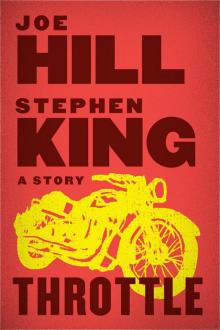 Throttle (Kindle Single)
Throttle (Kindle Single)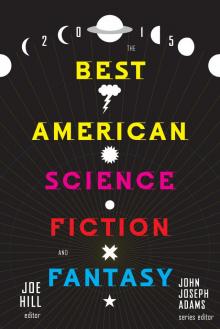 The Best American Science Fiction and Fantasy 2015
The Best American Science Fiction and Fantasy 2015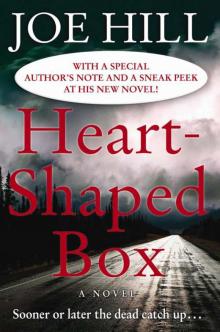 Heart-Shaped Box with Bonus Material
Heart-Shaped Box with Bonus Material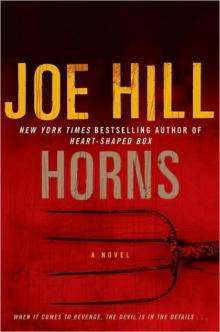 Horns: A Novel
Horns: A Novel